Paul Kent: Why Benji Marshall’s ‘Book of Wayne Bennett’ could backfire on the Wests Tigers coach
Benji Marshall spent his final playing years watching Wayne Bennett, filling his notebook with coaching strategies and philosophies. But unlike Bennett, he doesn’t have 50 years of coaching experience to fall back on, writes PAUL KENT.
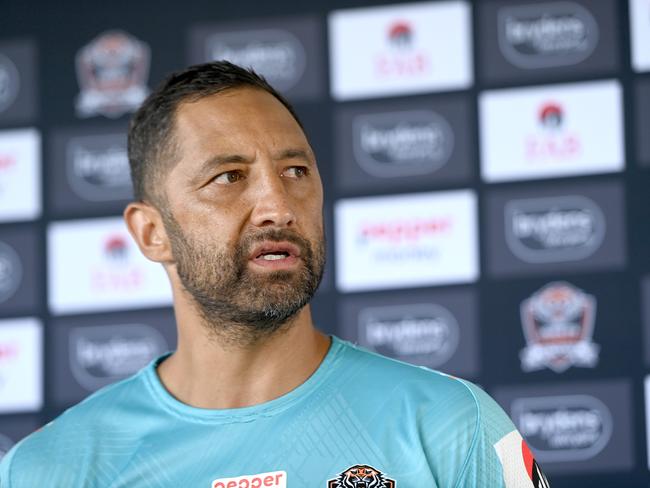
Opinion
Don't miss out on the headlines from Opinion. Followed categories will be added to My News.
It would surprise the recent coaching gurus and modern video analysts to hear that coaches were artists once upon a time. They ran on feel more than science.
The undisputed king of instinct was, of course, Jack Gibson.
There was a day Jack walked into a Parramatta halftime change sheds after the Eels had put in an uncharacteristically poor showing – this was back in the artistic age – and the Eels sat quiet with heads down, disappointed in themselves.
Jack was tall and imposing and liked to press it home when the moment mattered and so he walked into the dressing room once they were settled and, as heads picked up, he said nothing, picking up a plastic chair instead, which he then placed on top of the massage table.
Still not a word was spoken.
Then he climbed onto the massage table, sat on the chair and looked down at his team, still in silence.
The seconds grew longer …
Some players jiggled their studs, their nerves flowing through to the floor. The stage really was set to get the sermon from the mount this time.
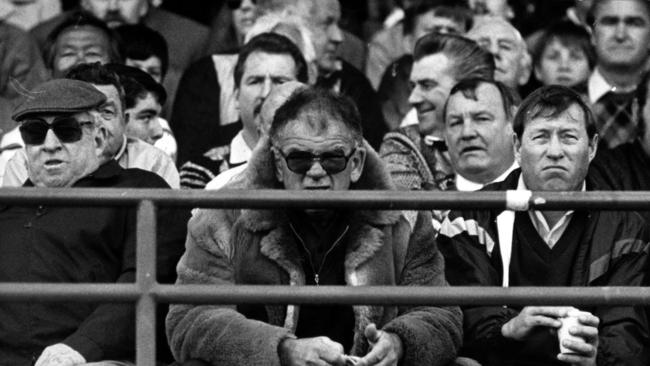
For several minutes Jack sat in the chair looking down at his disappointing team until, finally, the tension high, he spoke.
“As silly as I look up here,” he said, “that’s how silly you look out there.”
With that, Jack got down and walked out of the change sheds without saying another word.
The Eels got the message.
All the talk of X’s and O’s wasn’t going to help them if they were going to go out and do what they knew they had inside them to win. And the time wasn’t right for a Churchillian speech, or a kick in the backside or a chair thrown into a wall.
Times have changed since then.
Now, almost all coaches are tradesmen.
Copycat coaches that teach little different to what they have been taught when taking the same route from player to assistant to head coach. So their team’s style is basically identical to the next, it just being a matter of who does it better or who has the better players.
They sit through hours of video looking at the same things and all see the game the same way. There’s a formula to playing they all apply.
Innovations are subtle and gradual to change.
Get the wrestling coach in, tackle this way. Set a shape in attack, play this way.
If they don’t have the players to master the gameplay they don’t change the gameplay, they change the players. Tell the board they need a five-year plan.
The ones that last more than five years or so find something a little different. A niggle in the system.
Most coach safely.
The trick for Benji Marshall, then, is what kind of coach he is going to turn out to be.
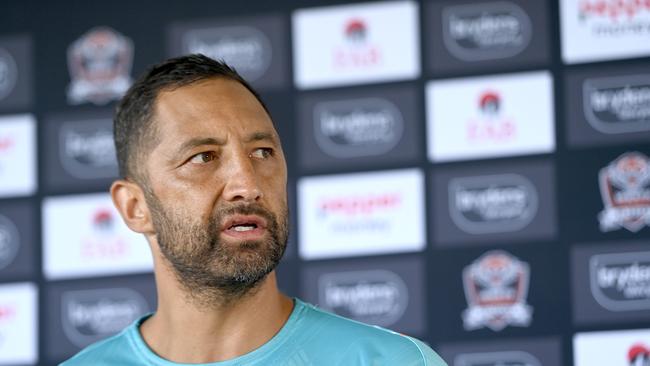
It’s a fascinating study, one for the scholars.
It’s not one for logic, not as the video labourers would see it.
Modern coaches work harder than a drover’s dog. Along with their assistants they are always the first in the office and last to leave. They leave the office with square eyes and spend what sleeping moments they have staring at a roof drawing imaginary plays.
Marshall has ditched most of this.
He is taking a risk, turning from micromanaging details in their game to working on the players holistically. The rest is just details, for his assistants to work out.
That is his fundamental difference.
In the years before he retired Marshall worked under Wayne Bennett at both Brisbane and South Sydney and beside him all the way was a notebook he filled in heavy ink on Bennett’s coaching strategies and philosophies.
Whatever was noteworthy.
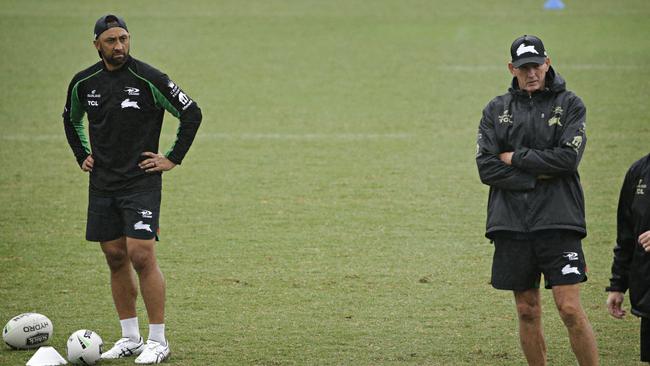
Bennett has never been the master strategist but no coach has managed players better and that’s where Marshall took his lead.
Marshall watched Bennett navigate the delicate politics at Souths, where personality dominates, and watched how Bennett would call the likes of Cody Walker and Latrell Mitchell into meetings under the grandstand to deliver a few honest truths in front of the leadership group.
Those who drive the culture.
Once out on the paddock, though, the rest of the squad to witness, Bennett would joke and play and cuddle them, bringing happiness.
Bennett’s management had a profound effect. He could see a way of making this coaching gig work himself.
In recent days Marshall has bristled that his different approach to training, much less hours than management, is not the normal and won’t succeed.
He is irked that his work ethic has been questioned.
In some ways, it mirrors his playing career, which took off equally as spectacularly but which saw his soaring talent overcome all the considered prejudices in the game.
He was young and unorthodox and his ears didn’t work.
No wonder he backs himself now.
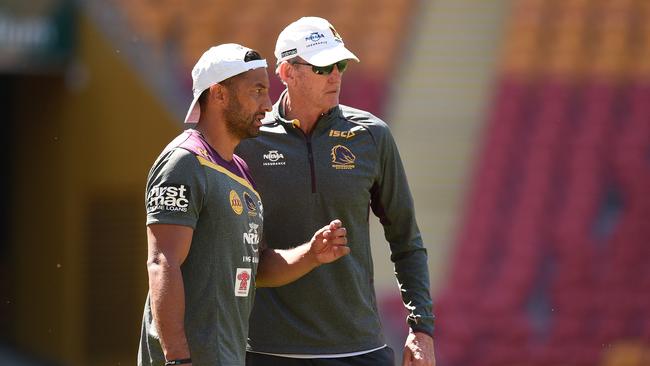
Whether it will work in the pressure cooker of coaching remains to be seen. No one truly knows.
The problem perhaps yet to be identified for Marshall is that Bennett has nearly 50 years in coaching, almost 40 straight years in the NRL, and his ability to spot problems and troubleshoot before they turn into major issues is as close to 20/20 vision as it gets.
And in his early years Bennett did almost all the hard work himself, to the point he would sit with wife Trish doing tackle counts together.
Marshall does not have that to fall back on as a coach.
Bennett’s eye for talent, for a player to come in and do a job, for a player necessary for the roster, are the equal of anybody.
Again, Marshall is untested.
Nobody knows whether it will work because it has never been done before like this.
In a Bennett way, whether intentionally or not Marshall has orchestrated one of Bennett’s old ploys, to take the conversation away from his team and put the pressure on himself as the Tigers try to begin his official coaching stint with a first up win against Canberra Saturday afternoon.
Marshall is backing himself to make it work.
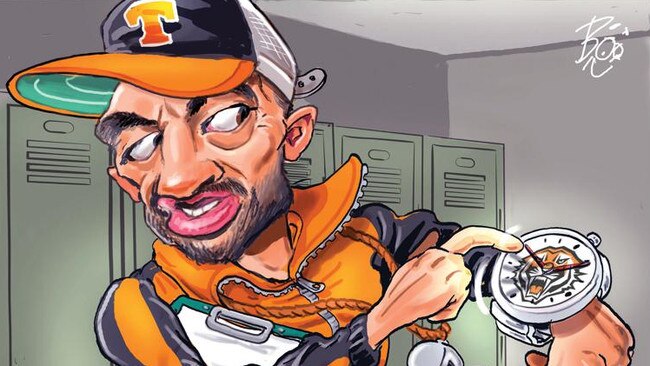
Against him is the weight of history. As best as the researchers can attest, there isn’t a coach in a major competition anywhere in the world who does at least some part of his business during the week from the golf course.
The philosophy is more work the more chance of success, an idea that never gets old in sport.
It has a precedent of one.
Bennett also worked from the Book of Jack.
When the Dragons trailed Sydney Roosters in the 2010 grand final Bennett walked into the dressing room and turned them around in just a few short words.
No chair on the massage table.
It might have been the shortest halftime speech in grand final history.
“How about we play like the Dragons?”, was all he said.
WHY BUNNIES WOES MAY BE UNFIXABLE
The problems at South Sydney might be unfixable.
For all the poor performance woes of Thursday night’s loss to Brisbane a glaring failure in the Rabbitohs was the lack of speed throughout the squad.
The edge players look like they’re running in things, with only Alex Johnstone giving
Countless times the Rabbitohs found themselves in space and either found themselves quickly run down by the speedy Broncos or, like when Cody Walker found himself in space with all that grass in front of him, none of his support could get there quick enough to take the run before Walker was run down himself.
Speed can’t be coached and the Rabbitohs have come up short in speed in both games so far and how they fix it remains to be seen.
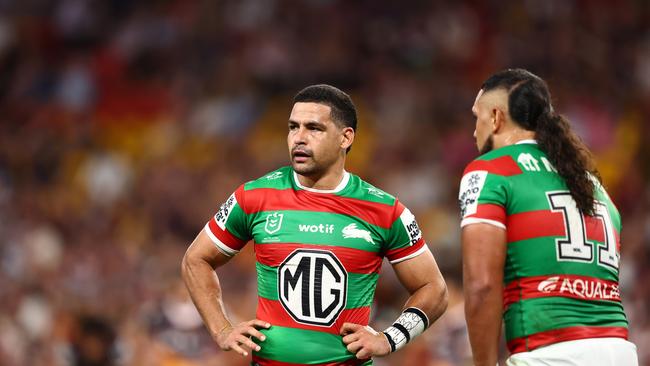
Without it, all Souths appear able to do for the rest of the season is graft out wins which is a tough way to make it through the season.
Combined with a kicking game that was about the worst produced in an NRL game for some years, especially by a team that considers itself a premiership threat, and the Rabbitohs have a whole lot of problems that need to be solved quickly.
They play the Roosters away in round three, Canterbury, the Warriors and Cronulla at home before the bye in round seven.
It’s conceivable they could be on just two points a quarter of the way into the season.
Maybe coach Jason Demetriou might need some radical surgery before Souths next play and bring Walker into half, debut Jack Wighton at five-eighth and move Lachlan Ilias to centre.
Ilias won’t improve the outside speed but he is a solid defender and decent runner that, without the playmaking duties, might get the job done while strengthening the halves, where they need it most.





